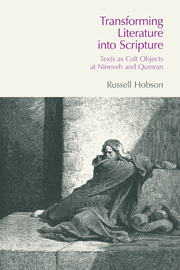Book contents
- Frontmatter
- Contents
- Acknowledgements
- Abbreviations
- 1 Authoritative Texts in the Hebrew and Cuneiform Traditions
- 2 Formulating a New Comparative Approach
- 3 Choosing the Right Texts
- 4 Study One: Enūma Anu Enlil Tablet 63
- 5 Study Two: Mul.Apin
- 6 Study Three: The Laws of Hammurabi
- 7 Study Four: Tablet XI of the Epic of Gilgamesh
- 8 Study Five: Mīs Pî
- 9 Study Six: Manuscripts of Pentateuchal Texts from Near the Dead Sea
- 10 Interpreting the Evidence
- Notes
- Bibliography
- Index of Ancient References
- Index of Authors
- Index of Subjects
10 - Interpreting the Evidence
- Frontmatter
- Contents
- Acknowledgements
- Abbreviations
- 1 Authoritative Texts in the Hebrew and Cuneiform Traditions
- 2 Formulating a New Comparative Approach
- 3 Choosing the Right Texts
- 4 Study One: Enūma Anu Enlil Tablet 63
- 5 Study Two: Mul.Apin
- 6 Study Three: The Laws of Hammurabi
- 7 Study Four: Tablet XI of the Epic of Gilgamesh
- 8 Study Five: Mīs Pî
- 9 Study Six: Manuscripts of Pentateuchal Texts from Near the Dead Sea
- 10 Interpreting the Evidence
- Notes
- Bibliography
- Index of Ancient References
- Index of Authors
- Index of Subjects
Summary
A detailed summary of all of the variants that have been analysed in this study that takes every facet of the examination into account is impractical. One can only make informed and qualified generalizations and try to capture some overarching pattern that may be found in the variations that occur throughout the sources. Where there are specific findings that can be inferred from the evidence there is also the risk of distortions that result from the constructed methodology. Similarly, while it may be tempting to speculate that certain findings could reflect overarching trends in the greater textual corpus, the notion that these are valid in any direct sense beyond the particular texts examined here must be resisted. As an analysis of individual representative texts from a selected range of genres, this study can only nominate some directions for future research that seem, from this small sampling, to warrant further investigation. A more comprehensive study of the ancient sources would determine if the conclusions presented here are truly borne out by the data.
A hazard to be avoided in summarizing a study such as this is the application of prescriptive conclusions that attempt to define too narrow a view as to what types of variation may or may not be expected in a given textual genre. In particular one should be prudently aware that historical accident, in large part reflected in the random and fragmentary preservation of the sources, plays a significant role in the emergence of statistical trends.
- Type
- Chapter
- Information
- Transforming Literature into ScriptureTexts as Cult Objects at Ninevah and Qumran, pp. 132 - 158Publisher: Acumen PublishingPrint publication year: 2012



